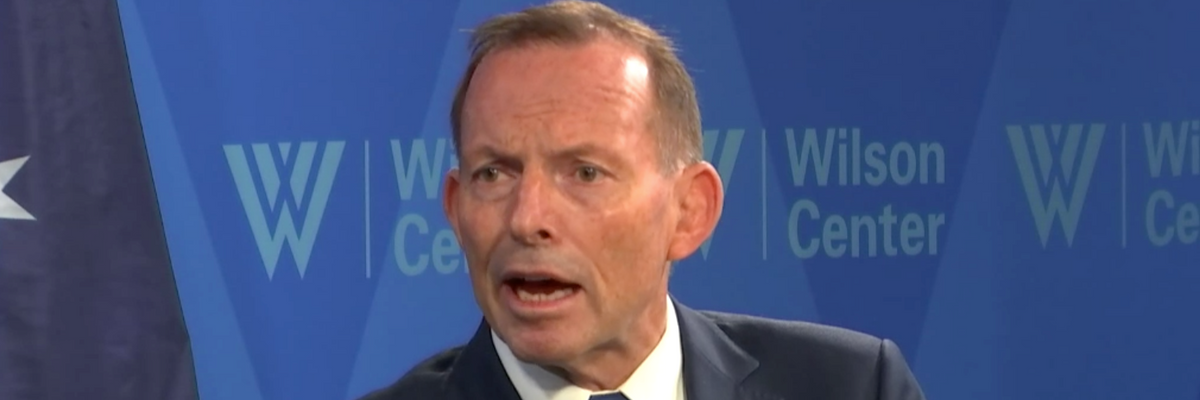Speaking at an event sponsored by the Wilson Center in Washington Friday, former Australian prime minister Tony Abbott called for the United States to go beyond the commitments laid out in the AUKUS submarine deal in the face of what he characterized as Chinese belligerence in the Indo-Pacific.
Abbott, who served as Australia’s prime minister from 2013 to 2015, held office amid a buildup of Australia’s economic ties with China. In recent months, however, he hailed the AUKUS deal as a “historic decision” which would make Australia a “much safer and stronger country.” Abbott also traveled to Taiwan in early October, where he met with President Tsai Ing-wen and delivered a keynote speech calling for global solidarity with the island.
Abbott expanded on the importance of democratic solidarity with Taiwan and increased military posture from western democracies in the Pacific. “Taiwan is the frontline of freedom,” Abbott remarked. “We have to be absolutely ready for a continued escalation from China on Taiwan up to, and including, a full scale invasion.”
Abbott blamed China for increased tensions and worsening relations with Australia, and argued that he believes Xi Jinping thinks that China is “pushing on an open door” in terms of the risks involved with escalation in Taiwan. He rationalized solidarity with Taiwan by noting its democratic values and strategic importance to the first island chain. In the event of a Chinese takeover of Taiwan, Abbott argued, “Japan would be dangerously exposed.”
On AUKUS, Abbott noted that the deal would only see Australian acquisition of operational nuclear submarine capabilities in two decades time. He stated that he has engaged in informal discussions to scout the possibility of Australian acquisition of a retiring US Navy Los Angeles-class or Royal Navy Trafalgar-class nuclear submarine to serve as a training vessel or as a direct addition to Australia’s fleet if necessary. “We need better, bigger, faster, and more wide-ranging submarines. Not in two decades time, but now,” Abbott said, stating further that the gap between Chinese and U.S. naval capabilities in the Western Pacific would only widen in the years to come.
Abbott painted an image of a China that was unwilling to engage in dialogue, even on matters of climate change. He expressed caution, contending that Western nations should not “turn their economies upside down to reduce emissions when China is not going to do so as well. It’s obvious that China will never do more than pretend to play ball on climate change. For China, at least under Xi Jinping, the main game is strategic domination.”
The former prime minister only lightly engaged with concerns about the potential costs of intensifying Australia’s security alliance with the US to balance against China. Complicating tensions in Australia’s relationship with China is the significant trading relationship between the two nations. Abbott argued, however, that Chinese imports of Australian coal and gas served as a potent reminder that China’s economy would also be hurt by a disruption of trade, and added that “China has more to lose than [Australia] from a cessation of trade.”
Responding to a question about the dramatic increase in military spending Australia would need in order to acquire and support an augmented submarine fleet, Abbott merely noted that both the current conservative Morrison government and the opposition leader of the Labor Party have committed to increasing current levels of defense spending of 2 percent of Australia’s GDP. Southeast Asia also came up almost as an afterthought in the event, even though the region is next door to Australia with its stability greatly at risk due to the emerging security competition.
Abbott gave a jingoistic characterization of Chinese behavior, offering only perfunctory statements about the possibility of dialogue. His linkage between a Beijing-controlled Taiwan putting Japan at risk offered a 21st century version of Cold War domino theory, which rationalized U.S. interventions, semi-permanent domestic war mobilization, and global primacy.
For Abbott, the answer to China’s growing presence on the world stage is evidently more military spending, increased rhetorical escalation, and solidarity among the world’s democracies in order to draw a battle line between freedom and Chinese hegemony. “The world needs the United States to be its policeman,” he added. “And if it is necessary for the US to act alongside partners, Australia will be there.”














